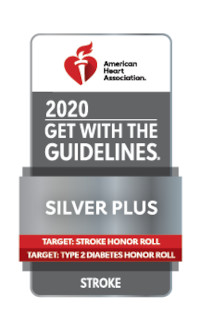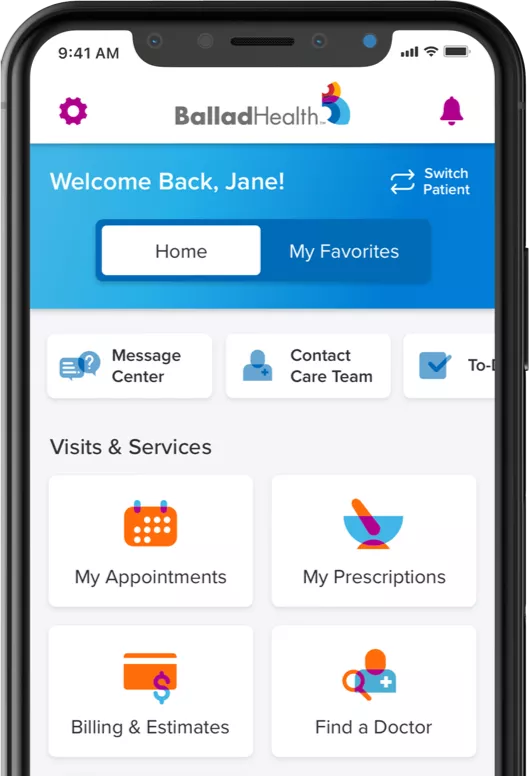Visit Vale Health Marketplace?
You are leaving balladhealth.org to visit Vale Health’s Wellness Marketplace.
Disclaimer: Ballad Health does not sponsor, endorse or recommend any product or resource listed in the marketplace.
When every minute counts, you need the best stroke care and you need it fast. The Advanced Thrombectomy-Capable Stroke Center at Johnson City Medical Center provides comprehensive stroke care for those at risk or suffering from vascular disorders of the brain and spine. We use the latest technologies to accurately diagnose and treat patients. Our physicians can perform minimally invasive stroke procedures. This means you get the most advanced treatment available, often with a shorter recovery time.
If you think that you or someone else is having a stroke, call 911 right away. Immediate treatment may save someone’s life and increase the chances for successful rehabilitation and recovery.
The F.A.S.T. initiative is a simple way to remember how to spot the signs of a stroke and what to do if you think someone is having one. Here’s what F.A.S.T. means:
Acting F.A.S.T. can make a huge difference in recovery from a stroke!
Our team works 24/7 to exceed national benchmarks for stroke care and treatment, resulting in better outcomes for our patients.
Month 2025 | # of tNk Patients | Door to Needle Avg. |
|---|---|---|
April | 9 | 45 minutes |
May | 6 | 47.8 minutes |
June | 9 | 52.1 minutes |
Month 2025 | # of Thrombectomies | Complications* |
|---|---|---|
April | 12 | 1 |
May | 6 | 0 |
June | 9 | 0 |
*Complication rates national standards should be less than 3%.
Find more information about these procedures and treatments here.
The brain needs a constant supply of oxygen and nutrients in order to function. A stroke, which can also be referred to as a brain attack, occurs when blood flow to the brain is disrupted.
A stroke is caused when either:
Even if there is a brief interruption in blood supply it can still cause problems. Brain cells begin to die after just a few minutes without blood or oxygen. Due to both the physical and chemical changes that occur in the brain with stroke, damage can continue to occur for several days.
The symptoms of stroke often happen quickly. They include:
If you think that you or someone else is having a stroke, call 911 right away. Immediate treatment may save someone’s life and increase the chances for successful rehabilitation and recovery.
Impairment of brain function occurs with the loss of brain cells.
A stroke can impair:
Recovery from stroke and the specific impaired ability depends on the size and location of the stroke.
A small stroke may result in problems such as weakness in an arm or leg.
Larger strokes may cause paralysis, loss of speech or even death.
You will be given specific instructions on the time to arrive at the hospital and where to check in. Once checked in you will be directed to a pre-operation area where you will change into a hospital gown, and you may get white stockings to wear to help prevent blood clots in your legs after surgery.
Our endovascular nurses will talk with you about the type of anesthesia and pain medication you will be receiving. And an IV line will be placed in your arm for fluids and medicine throughout your surgery.
As with all surgeries, you will be asked to sign a standard consent form prior to surgery and your surgeon will discuss the specifics of any risks associated with your individual situation. If you have any questions prior to surgery, please do not hesitate to ask your doctor or any other member of your healthcare team.
Johnson City Medical Center has earned The Joint Commission’s Gold Seal of Approval® and the American Heart Association/American Stroke Association’s Heart-Check mark for Thrombectomy-Capable Stroke Centers.
The Gold Seal of Approval® and the Heart-Check mark represent symbols of quality from their respective organizations.
Johnson City Medical Center has received the 2022 American Heart Association/American Stroke Association’s Get With The Guidelines®-Stroke Silver Plus Quality Achievement Award. The award recognizes the hospital’s commitment and success in ensuring stroke patients receive the most appropriate treatment according to nationally recognized, research-based guidelines based on the latest scientific evidence.

Johnson City Medical Center follows treatment protocols based on the guidelines from several national organizations, including:
Our goal is to alleviate your fears and help you to understand more about strokes. We have an informational video library, education tools and stroke-related FAQs so that you have the resources you need. You can learn how to spot a stroke, reduce your risk, cope with your emotions after a stroke and more.

Securely view your own or a family member's health records, review test results, pay your bill online and schedule a virtual visit with your doctor.
Message your doctor directly, easily book appointments, check in to an appointment and request prescription refills.